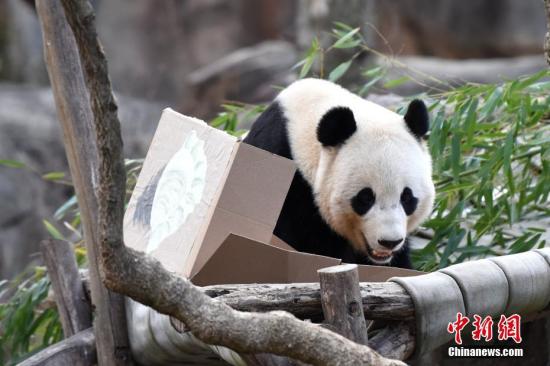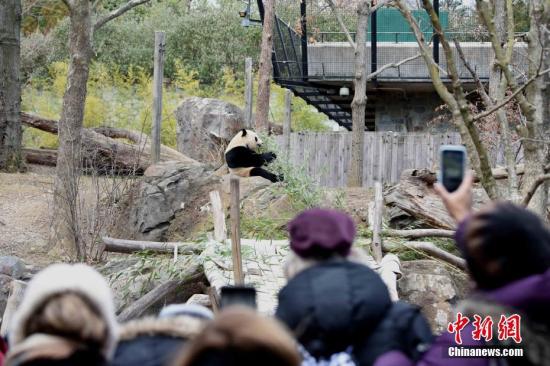The giant panda "baby" in the United States is about to return to China, and the American people are reluctant to send blessings.
China news agency, Washington, February 17 th: The giant panda "Baby" in the United States is about to return to China, and the American people are reluctant to send their blessings.
China News Service reporter Diao Haiyang
In less than four days, the giant panda "Bao Bao" in the United States will soon embark on a trip back to China. In the past few days, many Americans have gone to the National Zoo in Washington to bid farewell to their beloved "baby" and send their best wishes.
Baby, a female giant panda, was born at the National Zoo in Washington on August 23rd, 2013. Her parents are Tian Tian and Mei Xiang, giant pandas living in the United States. Rui Thompson, a biologist and deputy director of the Panda Pavilion at the Washington National Zoo, said that Mei Xiang didn’t give birth to a second cub until 2012 after giving birth to the male giant panda "Taishan" in 2005, but it only survived for a week. Therefore, the birth of a "baby" is simply a miracle.
"Baby" has attracted the attention of the United States since its birth. Its first public appearance made the whole Washington National Zoo very lively, and some fans drove for 9 hours just to see its budding state.

On February 16, local time, many Americans came to the National Zoo in Washington to bid farewell to the giant panda "Baby" in the United States. "Baby" will leave for home on the 21st of this month. China News Service reporter Yan Haiyang photo
The name "Baby" comes from an online voting activity jointly sponsored by the Washington National Zoo, the China Embassy in the United States and the US Embassy in China. On its centenary, the wives of the heads of state of China and the United States each sent blessings to it through a video. When it was one year old, the zoo also held a special "grab the week" ceremony.
In a blink of an eye, "Baby" has grown from a cute pink cub to a giant panda weighing 188 pounds (about 85 kilograms). According to the agreement between China and the United States, the "baby" needs to return to China before he is 4 years old.
The Washington National Zoo announced on the 6th of this month that Baby will leave for China on the 21st of this month, and the zoo will hold a six-day "Farewell to Baby" special event from the 16th.
On the first day of the event, a large number of fans and media reporters went to the panda hall of the zoo to bid farewell to the "baby". People raised their mobile phones and cameras to record its last week in Washington.

On February 16, local time, many Americans came to the National Zoo in Washington to bid farewell to the giant panda "Baby" in the United States. "Baby" will leave for home on the 21st of this month. After that, the number of giant pandas in the Washington Zoo will be reduced to three, namely, the parents "Tian Tian" and "Mei Xiang" and the younger brother "Beibei". China News Service reporter Yan Haiyang photo
In order to let people fully express their thoughts and wishes for the "baby", the zoo has prepared exquisite postcards. People can write messages on it and post them in the "mailbox". According to Allen Starbuck, a zoo worker, these postcards will go to China with the baby.
Stephanie Smith, who lives near the zoo, told China News Service that "Baby" is like her neighbor. She often walks to the Panda Pavilion to see it. She said that she likes "Baby" so much that it is hard to imagine what she will feel when she comes to the Panda Pavilion after it leaves. In order to see the "baby" more, she decided to come to the zoo to see it every day from the 16th.
Debbie Davis, a volunteer at the zoo, said that she witnessed the birth, growth and departure of Mount Tai, and now the same thing will happen to the baby. She said that in more than three years, she went to the Panda Pavilion countless times to see the "baby", but when it finally left, it was still very sad.
On the zoo website, the keepers of "Baby" wrote down the details of getting along with it day and night. Jenny Spoton wrote, "This is the first giant panda I have come into contact with since I worked. I watched it grow from the size of a butter stick to today. During this period, I have gained too many things. "
Stacy Taipola Rio wrote, "Sometimes it looks introverted, sometimes it looks active. At night, it will jump up and down, throw its toys around and have a good time. "
On the morning of 21st of this month, "Baby" will depart from Washington National Zoo and go to Washington Dulles International Airport. Later, it will fly to Chengdu, China on a cargo plane of FedEx.
The breeder Marty Dilry said that recently, they have been helping the "baby" adapt to its aviation box. He said with a smile, "Baby" has performed very well and may have fallen in love with its aviation box.
"Baby" is a crystallization of the cooperation between China and the United States in the field of giant panda research and protection, and it is also the messenger of Sino-US friendship. Netizen Heather Heckel left a message on the Facebook page of "Baby" on the 16th, saying, "Dear ‘ Baby ’ Thank you for letting us watch you grow up, for giving us hope for protecting endangered species, and for bringing the people of the United States and China closer together. " (End)